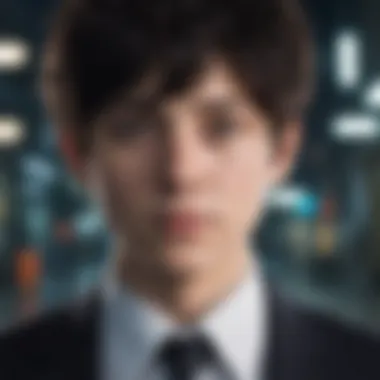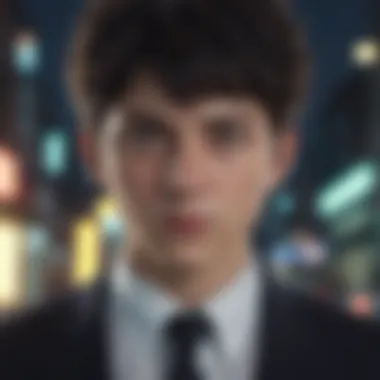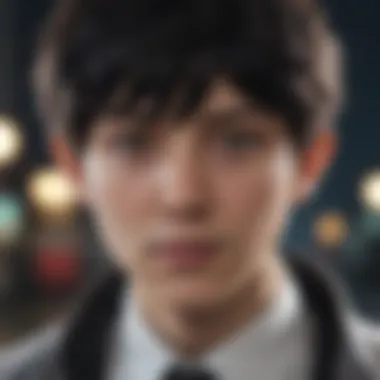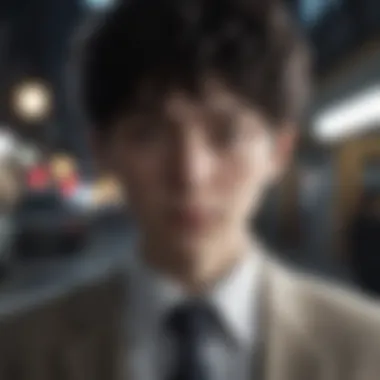Exploring the Depths of Mob Psycho Episode 1


Intro
The debut episode of Mob Psycho 100 sets the stage for what is to come in a vibrant narrative world. This episode not only introduces the audience to the protagonist Shigeo "Mob" Kageyama but also hints at the intricate layers of psychological and supernatural themes that form the core of the series. From the get-go, we are thrust into a unique blend of humor, melancholy, and existential questions around the nature of power and self-identity.
In many ways, Mob Psycho 100 challenges the conventions of typical shounen anime. It peels back the layers of not just psychic abilities, but also the human condition itself. This episode serves as both a bonding point and a turning point, establishing the relationships Mob shares with those around him, especially with his mentor Arataka Reigen.
The striking visuals, combined with a whimsical yet profound narrative style, catch the viewer’s attention, creating an ambiance that is both lively and contemplative. These elements allow us to not only witness Mob's struggles but also ponder broader philosophical questions about the essence of strength and individuality.
From dissection of the character arcs to exploration of thematic resonances, the following sections will delve deep into the various facets of this crucial first episode.
Industry Insights
The anime industry has witnessed a seismic shift in recent years, with unique shows like Mob Psycho 100 breaking through the norms that have long defined the genre. Here's an exploration of the current landscape:
Latest Trends in Anime Industry
- Diversity in Storytelling: More series are weaving in diverse narratives that resonate with a global audience. Shows are exploring themes of identity, belonging, and personal growth distinctly.
- Blend of Genres: A growing trend is the merging of different genres that creates hybrids. An example can be seen in how Mob Psycho 100 intertwines supernatural elements with everyday life.
- Emphasis on Psychological Themes: There’s an increasing focus on mental health and introspection, improving the depth of character development.
Behind-the-Scenes of Popular Anime
The animated execution of Mob Psycho 100 is largely credited to the skilled team of animators at Bones Studio. The visualization, such as Mob's psychic outbursts, offer a refreshing take compared to traditional animation styles in anime. This distinctive flair highlights not just his powers, but the internal turmoil he faces.
Behind every spectacular moment in anime, there are countless hours of meticulous planning and creativity. The magic is in the details.
Reviews & Recommendations
- Must-Watch Anime Recommendations: If you enjoyed Mob Psycho 100, consider watching series like One Punch Man, which shares much of the same creative team, or Hunter x Hunter, known for its compelling character arcs and philosophical depth.
- Deep-Dive Reviews: Look for analyses that unearth thematic discussions in shows, which can significantly enhance your understanding beyond surface-level enjoyment.
News & Updates
Keeping up with the anime scene is important, especially as new seasons unfold:
- Check for announcements about Mob Psycho 100’s subsequent seasons, as well as how they are being received in fandom circles.
- Social media platforms like Reddit often offer real-time discussions and reactions that can illuminate rising trends in character development.
Feature Articles
As Mob Psycho 100 garners recognition, numerous discussions surrounding its symbolism and character studies are surfacing:
- Analyses of Iconic Characters: Delve into the layers of Mob and Reigen, understanding their complex dynamics and what they represent in contemporary storytelling.
- Genre Comparisons in Anime: This show stands at an intersection of comedy, supernatural, and drama, making it a perfect example for comparison with other works in the genre.
Through this analysis of Mob Psycho 100 Episode 1, a complex, multi-layered narrative emerges, drawing viewers into a tale where every character and theme is rich with meaning. A careful examination of the episode reveals insights that speak to both personal and universal experiences, awaiting to be unraveled further as the series progresses.
Prolusion to Mob Psycho
Understanding Mob Psycho 100 starts with acknowledging its substantial place within the anime landscape. This series, crafted by ONE, not only entertains but also pushes the boundaries of traditional storytelling through its blend of comedy, supernatural elements, and profound themes. The importance of Episode 1 cannot be overstated; it acts as a microcosm of the series’ ethos and sets the stage for the entire narrative arc.
The initial episode introduces viewers to our protagonist, Shigeo Kageyama, or as he’s colloquially known, Mob. Yet, it does more than just give us a glimpse into Mob’s life as a psychic; it lays the groundwork for the significant existential questions and character dynamics that resonate throughout the series. By examining these early moments, we not only learn about Mob’s abilities but also understand the emotional weight he carries, particularly concerning his identity and the expectations placed upon him.
Overview of the Series
Mob Psycho 100 is distinct in its approach to character development and storytelling. The viewer is presented with a protagonist who seems ordinary at first glance but possesses extraordinary powers. Throughout the series, themes of self-acceptance, the burden of expectations, and the harsh realities of adolescence come together, creating a rich tapestry of experiences. The artwork is an eclectic mix of sharp, dynamic visuals contrasted with softer, whimsical moments that mirror the duality of Mob’s life: an outwardly quiet existence juxtaposed against the tumultuous inner world of a psychic.
Contextual Importance of Episode
The first episode of Mob Psycho 100 serves multiple purposes. Firstly, it introduces the audience to the everyday life of a boy handling psychic phenomena while grappling with his emotional landscape. In the bustling scenes, Mob’s interactions with his surroundings—whether it’s school life or encounters with spirits—are painted with a brush of humor and underlying tension.
Moreover, it cleverly sets up the series’ tone. It’s neither solely light-hearted nor entirely somber; rather, it forges a fluid narrative that captures the nuances of adolescence: the confusion, the isolation, and the hope for acceptance. As viewers embark on this journey, Episode 1 yields the profound realization that power—be it personal or supernatural—comes with its unique set of challenges and responsibilities. The groundwork laid in this episode fuels the narrative tension and character growth that defines the series, ensuring audiences are invested from the very start.
"Mob Psycho 100 shows that the struggle for identity is sometimes more daunting than facing the supernatural itself."
By grasping the importance of the introduction in light of the broader narrative, the audience is invited to reflect on their own experiences with identity and belonging—all enriched by the vivid storytelling and character evolution that follows.
Narrative Structure of Episode
The narrative structure of Episode 1 in Mob Psycho 100 plays a crucial role in establishing the series' distinct storytelling style and emotional undercurrents. By expertly weaving plot and theme through a well-defined framework, the episode sets the tone for everything that follows. The pacing, the integration of character backgrounds, and the hints at future conflicts create a robust foundation. These elements invite viewers into Mob’s world while capturing their interest immediately.


Plot Summary
With the stage set, Episode 1 opens with a portrayal of Shigeo Kageyama, commonly known as Mob. Mob is not your typical middle school student. While he appears unremarkable on the outside, he possesses overwhelming psychic abilities. The episode kicks off by showcasing his powers in a way that doesn't just wow the audience but calls into question the weight of such gifts. Mob's world is immediately contrasted with the mundane lives of his peers, emphasizing his isolation despite having a unique talent. The plot develops through key scenes, such as Mob’s attempts to navigate daily life, his interactions with Arataka Reigen, and the realization of the emotional burdens that come with his abilities.
The narrative flows smoothly, introducing Mob's friends and the social circles he tries to fit into. The opening episode hints at his struggles with self-control while setting up a pivotal incident involving a rival. As the tension builds, viewers discover that Mob prefers to keep a lid on his powers to avoid rampaging—this choice becomes the crux of his internal conflict.
Key Themes Established
Several profound themes emerge right within the first episode that resonate throughout the series.
- Power and Control: The unsettling reality of having extraordinary abilities but needing to suppress them is evident. Mob’s reluctance reflects a universal struggle with accepting one’s true self in the face of societal expectations.
- Isolation: Mob's powers isolate him from his peers, hinting at the loneliness that often accompanies uniqueness. His desire for acceptance yet simultaneous need to hide who he is rings true for many, serving as a powerful commentary on teen life.
- Identity: As viewers delve deeper into Mob's psyche, questions arise about the essence of identity. Is Mob merely the powerful psychic, or is his true self intertwined with his emotional state? The episode sets up these questions, hinting at future explorations about who Mob really is beneath the layers of psychic power and social expectation.
"The beauty of Mob Psycho’s storytelling lies in its ability to resonate on multiple levels, addressing not only the supernatural but also the human condition."
These themes don’t just resonate within the episode; they lay the groundwork for character arcs and conflicts throughout the series, making the narrative structure in this episode critical to understanding and diving deeper into Mob Psycho 100.
Character Intros
The first episode of Mob Psycho 100 serves as an engaging preface to a story rich in emotional depth, character complexity, and thematic exploration. Character introductions are pivotal, setting the stage for the relationships and conflicts that will unfold throughout the series. They not only capture the audience’s attention but also lay the groundwork for character arcs that evolve over time. Understanding who these characters are helps the viewers connect emotionally and intellectually with their journeys.
Shigeo Kageyama - Mob
Personality Traits
Shigeo Kageyama, affectionately known as Mob, presents us with a character steeped in contradictions. On the surface, his demeanor is calm and unassuming; he often appears indifferent and even somewhat dull. Yet this nonchalance hides a profound complexity. The beauty of Mob's personality lies in his growth over the series. His introversion reflects a deeper feeling of inadequacy, making it a relatable trait for many viewers. In this context, Mob’s struggle to express emotion becomes a key element, for it forces us to contemplate the masks we wear in society. His innate desire for connection and recognition adds layers to his character that are essential for driving the narrative forward.
Psychic Abilities
Mob's psychic powers are not just a spectacle; they serve as a pivotal aspect of his identity. His ability to harness immense psychic energy creates moments of gripping tension, grounding the supernatural elements within his personal conflicts. Mob's powers, while remarkable, also bear the brunt of his emotional turmoil. This dynamic enriches the storytelling by presenting a protagonist who is not merely powerful but deeply affected by their abilities. The juxtaposition of power and vulnerability illustrates how, instead of granting freedom, psychic abilities can sometimes become a burden, forcing Mob to question his place in the world.
Conflict with Emotions
The theme of emotional struggle is woven tightly into Mob's character. His ability to suppress feelings as a method of coping with his psychic power sets up an internal conflict crucial for the narrative. Mob’s journey revolves around learning to embrace his emotions, which is not just significant for his character development; it resonates on a universal level. Many can relate to feelings of isolation stemming from the inability to connect or articulate what one feels. His journey is a compelling reflection on authenticity and the importance of emotional expression in shaping our identity.
Arataka Reigen
Role as a Mentor
Arataka Reigen acts as both a source of guidance and a humorous foil to Mob. He is a self-proclaimed psychic who, despite lacking actual powers, navigates the supernatural world with cunning and charm. The mentor-student dynamic not only adds humor but also carries deeper implications about mentorship. Reigen embodies the concept that wisdom doesn’t always align with power; his teachings often come down to life lessons wrapped in questionable ethics. This stark contrast highlights the idea that influence can manifest in various forms, illuminating how Reigen shapes Mob's perspectives, albeit in unconventional ways.
Morality and Ethics
Reigen's character raises pertinent questions about morality and ethics within the context of psychic phenomena. His questionable business practices, including deceiving clients about the nature of his abilities, force the audience to question the integrity of so-called experts. As a mentor, he instills critical life lessons, but the moral ambiguity of his actions can leave one pondering the ethical lines one should not cross. Reigen's character invites us to think about how one can still have a positive impact through flawed means, generating conversations around the nature of good and bad intentions in unconventional scenarios.
Contrast to Mob
The disparities between Mob and Reigen are nuanced and engaging. While Mob struggles with his emotions and seeks acceptance, Reigen often exudes a layer of confidence, masking his own insecurities under a guise of charm. This contrast serves several purposes; it not only provides comedic moments but also grounds Mob's character in a more relatable reality. The mentor’s more extroverted persona highlights Mob's introversion, underscoring the thematic exploration of individuality versus societal expectations. This relationship lays the foundation for Mob’s journey toward self-acceptance, making Reigen an indispensable part of Mob's growth.
Supporting Cast Overview
Dimple's Role
Dimple is introduced as an interesting and somewhat comedic character who embodies the chaos of the supernatural world that Mob finds himself in. His role as a spirit wanting to possess Mob shows both humor and the darker side of his existence. Dimple represents the lure of power and the ethical dilemmas that come with it. He tempts Mob to explore the possibility of his abilities being used for selfish gains. The tension between Mob and Dimple underscores the ongoing struggle between good and evil, adding layers to the narrative that invite the audience to ponder the price of power and its implications on one’s moral compass.
Kageyama Family Dynamics
The portrayal of the Kageyama family provides a backdrop to understand Mob's character more effectively. The interactions with his family serve as both a source of support and a catalyst for Mob's conflict with his identity. The dynamics within the family reveal how being different, particularly with such a powerful gift, can lead to misunderstandings and isolation. This layer of Mob’s life elucidates the emotional complexities that he faces, emphasizing the fragile nature of familial bonds in the face of his extraordinary abilities. By exploring these personal relationships, the story deepens its exploration of themes such as acceptance and the struggle for identity.
The character introductions within Mob Psycho 100 establish a rich landscape for exploring deeper themes that resonate with a broad audience while establishing the groundwork for future episodes.
Thematic Exploration
In exploring the narrative of Mob Psycho 100, thematic exploration takes center stage, allowing viewers to dive into the emotional and philosophical depths behind the characters and their experiences. The first episode doesn't just serve as an introduction; it sets the stage for an intricate examination of psychological weight, societal alienation, and the quest for identity. These themes resonate not only with the main character, Mob, but also reflect broader questions about human existence, making this theme crucial for understanding the series as a whole.
The Burden of Psychic Power


Mob Kageyama’s psychic abilities act as both a gift and an overwhelming burden. This paradoxical nature is pivotal in understanding Mob's character. He possesses immense power, yet it isolates him from his peers. The constant struggle to control this power becomes apparent in the opening scenes where Mob's psychic feats often result in unintended consequences.
The burden comes from the expectations placed upon him; friends and family see his abilities as something extraordinary, while he longs for an ordinary life. This inner conflict between expectation and desire lays the foundation for Mob’s character arc where he grapples with understanding himself beyond just being a psychic. When Mob exclaims that he wants to be ‘ordinary,’ it seems trivial on the surface, but it reveals the deeper desire for acceptance and belonging, an element crucial to the show’s thematic fabric.
Isolation and Acceptance
The theme of isolation runs heavy through Mob's experiences right from the outset of the series. His supernatural capabilities push him to the fringes of teenage social dynamics, making it hard for him to connect with his peers. This sense of estrangement is further aggravated by his emotional suppression. The more he hides his feelings—fear, sadness, and joy—the deeper his isolation becomes.
Mob’s relationship with Reigen serves as a contrasting underpinning to this sense of isolation. Reigen not only presents a mentor figure but also acts as a bridge, guiding Mob back to a path of acceptance. As the two interact, Reigen’s tendency to disregard Mob’s powers while fostering his emotional intelligence fosters genuine connection. The duality of Mob's isolation and his journey towards acceptance is poignantly illustrated, leading viewers to ponder the importance of social belonging and the strength that arises from it.
"In the end, it is not the power itself that defines us, but how we choose to connect with others, despite the burdens we carry."
Identity Formation
Identity in Mob Psycho 100 is complex; Mob’s character serves as a lens through which various identities are explored. The struggle he faces to define himself outside of his psychic abilities mirrors a universal quest for self-discovery that many individuals encounter. His journey raises questions: Who is Mob Kageyama when he is not using his powers?
The series adeptly portrays the formative years of adolescence, where outside influences and internal conflicts shape self-perception. The episode offers glimpses into Mob's family dynamics, particularly through his interactions with his brother, which reveal that familial relationships heavily impact one's identity formation. As Mob navigates through relationships and societal expectations, he slowly begins to piece together his authentic self, navigating the delicate balance between his abilities and his humanity.
Through these narratives, Mob Psycho 100 not only tells a story of a young boy with exceptional powers but delves into the intricacies of what it means to search for one’s identity amidst external pressures, isolation, and the heavy toll of societal expectations.
Cinematic Techniques
The cinematic techniques in Mob Psycho 100 Episode 1 play a crucial role in shaping the viewer's experience. They transform simple storytelling into a visceral encounter. Each technique not only enhances the narrative but also helps in cultivating the show's distinctive identity within the crowded anime landscape. By examining the visual style, use of color and light, as well as sound design and music, one can appreciate how these elements collectively serve to accentuate the show's themes and character arcs.
Visual Style and Animation Quality
The visual style of Mob Psycho 100 sets it apart from other anime series. The animation quality is both refreshing and engaging, juxtaposing crisp lines with exaggerated expressions that showcase the characters' emotions vividly. In this first episode, the bursts of color and fluid motion during psychic battles contrast sharply with Mob’s often subdued demeanor, underscoring his internal struggles.
Characters are animated with exaggeration, a method that breathes life to their personas. Take Mob's blank stare as an example; it illustrates his emotional detachment, yet at pivotal moments, the animation transitions into lively sequences, reflecting his psychic powers. This dynamic creates a visual language that tells the audience what words often cannot.
Use of Color and Light
Color and light in Mob Psycho 100 do more than just enhance the visuals; they set the mood and foreshadow events. Bright, vibrant colors often convey the energy and excitement of Mob's psychic abilities. In contrast, muted shades often represent moments of isolation or vulnerability, particularly in scenes showcasing Mob’s struggles with self-acceptance.
Lighting is used strategically to favor certain scenes. Dim lighting can make a character look more vulnerable, while brighter lighting may symbolize moments of hope or victories, however small. An instance of this is when Mob faces off against his first major antagonist; the shift in lighting could be symbolic of an internal struggle—bringing the viewer deeper into his emotional core.
Sound Design and Music
Sound design is equally indispensable in creating the overall atmosphere of the episode. The subtle nuances of sound effects paired with the music build an ominous yet hopeful mood that resonates throughout the series. The score blends jazz and classical elements, enhancing emotional moments while also complementing the visual aesthetics.
In particular, the music crescendos during fight scenes, amplifying tension and energy. In softer moments, music takes a step back, allowing the poignant silence to speak volumes about Mob’s inner conflict. It is these little details that make the viewing experience immersive, wrapping the audience in the world of Mob Psycho 100.
"The unique combination of visual flair, keen color choices, and masterful sound design crafts an emotional landscape that mirrors Mob's intricate experiences."
Comparative Analysis
In the realm of anime, every new series launches into an already rich tapestry of storytelling and artistic expression. The importance of Comparative Analysis in this context can’t be overstated. It allows viewers to recognize not just what separates 'Mob Psycho 100' from its contemporaries, but also to appreciate the subtle nods and elements that forge connections with the broader genre.
Through a comparative lens, we can dissect character tropes, thematic concerns, and stylistic choices that resonate across various titles. This practice invites the audience to see both the originality and the influence of 'Mob Psycho 100,' positioning it within a continuum of anime that encompasses everything from Naruto to Neon Genesis Evangelion.
Comparison to Other Anime Premieres
When we look at the first episodes of other anime series, such as Attack on Titan or My Hero Academia, we often find common threads in pacing, character introduction, and themes. Each of these shows seeks to hook the viewer from the get-go by crafting a world that feels both expansive and intimate. Mob Psycho 100 stands out because, while it does share these traits, its unique blend of humor and existential weight differentiates it from typical action-oriented premieres.
In Mob Psycho 100, the immediate introduction of Shigeo Kageyama—known as Mob—invites audiences not just to witness his psychic abilities, but to feel the weight of his emotional struggles. Unlike the more overtly action-packed sequences shown in other series, Mob's narrative unfolds with a more reflective introspection. This differentiates Mob’s journey from other anime protagonists who often charge forward into conflict with little internal conflict.
- Contrast in Tone: While Attack on Titan immerses viewers in a world of despair and urgency, Mob Psycho 100 balances its darker themes with genuine moments of levity.
- Character Depth: The emphasis on Mob's inner turmoil and relationships from the first episode sets a foundation unlike anything seen in many action-anime.
- Visual Presentation: Visually striking yet deceptively simple, the animation style of Mob Psycho 100 also serves to emphasize emotional expression, standing apart from the more polished, high-adrenaline looks adopted by mainstream series.
Cultural References Insight
Cultural references in Mob Psycho 100 are a testament to its broader social commentary. The show doesn't just thrive within its fantasy world but also reflects real social dynamics, particularly in Japanese culture. For example, the portrayal of psychic abilities serves as a metaphor for societal pressure and the oft-experienced isolation among youth in contemporary Japan.
Mob's struggle with his powers can be mirrored in the everyday experiences of adolescents facing expectations from family and society, threading a narrative that feels both personal and universal. This layer of cultural critique sets Mob Psycho 100 apart from other anime that may not engage with societal issues as deeply, leaving characters to wander through their fantastical settings without a substantial grounding in reality.
- Metaphors for Growth: Mob’s powers embody the potential and weight of personal growth, resonating not just in Japan but in a global context where young people grapple with identity.
- Social Commentary: The characters interact in ways that echo real-life tensions—bullying, mentorship, and the often tumultuous path to adulthood.
- Diversity of Influence: The show draws on multiple sources, from classic shōnen tropes to modern psychological themes, showcasing a blend of cultural influences that enrich its narrative.


The comparative analysis reveals how 'Mob Psycho 100' doesn’t merely exist in a vacuum but engages in an ongoing dialogue with other works and societal phenomena.
Viewership Reaction
The topic of viewership reaction is integral to comprehending the significant impact of a show like Mob Psycho 100, especially its inaugural episode. When an anime premieres, the way audiences respond speaks volumes about its potential trajectory, cultural resonance, and even its artistic merit. Understanding these reactions allows us to appreciate not only the show's initial reception but also how it might evolve in the broader anime landscape.
Critical Reception
Critical reception can often set the tone for a series, marking it either as a must-watch or a – quite frankly – never-will-be option. Critics engaged deeply with the premiere episode of Mob Psycho 100, noting its unique blend of humor, emotional depth, and striking visuals. Many praised the narrative style, highlighting how the show mixes absurdity with profound themes of identity and isolation.
Some key points raised by critics include:
- Innovative Animation: Critics applauded the animation quality from Studio BONES, indicating how the visuals elevated the storytelling. The stylized art brought the characters to life in a way that few other shows managed.
- Character Development: Commentators emphasized Mob's introverted nature and struggle with his psychic powers, setting up a compelling journey that resonated with many viewers.
- Concept Against Societal Norms: The first episode’s approach of deconstructing typical shonen tropes drew attention, positioning Mob Psycho 100 as a narrative that invites deeper philosophical questions.
One prominent critic stated, "The series’ ability to blend comedy with genuine emotion makes it sliver a cut above your average anime fare." This kind of insight highlights the episode's initial success in capturing both critical and audience imagination.
Audience Analyses
While critics often have an informed perspective, audience analyses often reflect a more communal sentiment, revealing how viewers interact with the narrative and characters on a personal level. For Mob Psycho 100, audiences expressed a mixture of delight and introspection through various platforms, particularly social media.
Some of the common sentiments echoed by fans include:
- Relatability: Viewers found themselves identifying with Mob’s social struggles. Feelings of isolation and the fight for acceptance resonated with many, as folks shared experiences paralleling Mob's journey.
- Expectations Set by Previous Works: For those familiar with ONE's previous work, One Punch Man, many were eager to see how this series would diverge. The comedic timing and emotional undertones did not disappoint, creating a buzz that kept fans engaged and speculating about plot developments.
- Community Engagement: Forums on Reddit and Facebook exploded with discussions about the episode, showcasing a thriving community dissecting every intricacy. It included everything from artistic style choices to deeper meanings in the storyline.
Overall, the viewership for Mob Psycho 100 Episode 1 was not merely about ratings; it carved out a space in the anime community that sparked conversations, debates, and connections among fans. As the episode laid the groundwork for character development and thematic exploration, the audience analysis contributed to an ongoing narrative about identity, power, and emotional growth that people could not help but talk about.
"A show's success begins not just in its storytelling but in how it connects with its audience - that is where true art lies."
In essence, analyzing both the critical reception and audience reactions provides a nuanced understanding of how Mob Psycho 100 Episode 1 set the stage for its future success and cultural relevance.
Influence on Anime Landscape
The anime series Mob Psycho 100 stands as a landmark work in the contemporary landscape of animated storytelling. Its influence extends beyond mere viewership and crafting a dedicated fanbase. What sets this show apart is its audacious reimagining of familiar themes often seen within the genre, coupled with a distinctly innovative narrative style. By taking conventional notions of power and identity and flipping them on their head, Mob Psycho 100 doesn’t just join the conversation—it reshapes it.
Impact on Genre Trends
With Mob Psycho 100, there’s a notable shift in how psychic abilities are portrayed in anime. Instead of focusing solely on battles and spectacle, the series lays much emphasis on the emotional burdens that come with such gifts. This approach resonates with audiences and has sparked a trend toward deeper character exploration in similar series.
- De-emphasis on Combat: Many new shows now prioritize character growth and emotional arcs over traditional action.
- Complex Protagonists: Just like Mob, characters are now often multi-dimensional, questioning their powers’ morality instead of reveling in them.
- Weakness as Strength: This subversion of tropes means that vulnerability is now recognized as a powerful narrative tool.
In short, the narrative choices in Mob Psycho 100 have encouraged writers and animators to explore the spectra of emotional and psychological conflict, without relying heavily on high-octane action. This outcome has prompted a surge in anime that wants to analyze its characters—and that’s a big deal in a genre traditionally fixated on grandeur.
Legacy of Mob Psycho
The legacy of Mob Psycho 100 is bound to the conversations it ignites concerning identity and societal expectations. It offers a unique lens that effectively critiques not only the high-pressure environment of school life but also the larger societal constructs surrounding power and responsibility.
"Mob Psycho 100 demonstrated that humor, heart, and deep philosophical inquiry can coexist in a single narrative—something that is often overlooked in mainstream anime."
- Cult Following: The series has developed a cult following that thrives in various fandoms, creating fan art, memes, and discussions across platforms like Reddit and Facebook.
- Award Winner: It garnered accolades not just for its animation, but also for its storytelling, influencing awards and recognition for future works that dare to tread similar paths.
- Crossover Appeal: The show has successfully appealed to both anime aficionados and newcomers due to its ability to balance accessible humor with profound themes.
The End
The conclusion of this analysis serves as a spotlight, illuminating the intricate threads woven through the first episode of Mob Psycho 100. In this article, we dissected various facets of the narrative, character interactions, and thematic depth, establishing why this premiere stands out in the broader landscape of anime.
Summary of Key Insights
A few pivotal insights emerged from our in-depth examination:
- Narrative Complexity: The episode lays a well-structured foundation, introducing us to Mob's internal struggles and the external chaos that surrounds him. This duality is not just a storytelling device but a reflection of real-world complexities that viewers can relate to.
- Portrayal of Psychic Abilities: Rather than glorifying psychic power, the show intelligently presents it as a burden. Mob's struggle illustrates the often unrecognized weight that extraordinary abilities can impose on individuals, setting the stage for future development.
- Character Dynamics: The relationship between Mob and Reigen is vital, showcasing layers of mentorship that go beyond mere guidance. Reigen’s morally ambiguous persona adds depth to the narrative, making the audience question the nature of guidance and influence.
"Mob Psycho 100 does not shy away from showing that the path to self-acceptance is paved with tough realizations."
These insights highlight not merely what the episode presents on surface level, but also provoke introspection about personal identity and the consequences of power.
Looking Ahead to Future Episodes
As we anticipate the upcoming episodes, several expectations arise:
- Character Evolution: The distinct trajectories of Mob, Reigen, and supporting characters are ripe for exploration. How will Mob's understanding of himself evolve as challenges arise? Will Reigen's influence lead Mob astray or into clarity?
- Thematic Advancement: The exploration of themes like isolation, identity, and the weight of expectations seem poised to deepen. Future episodes may unravel complexities we have only glimpsed, particularly in how Mob copes with societal norms and his own expectations.
- Visual and Aural Innovation: Given how stylistically engaging the first episode was, viewers likely look forward to more innovative animation techniques and soundscapes that enhance emotional storytelling.
In sum, this initial episode serves not just as a standalone introduction but as a gateway into a rich world begging for further exploration. The blend of character development and philosophical inquiry will undoubtedly make Mob Psycho 100 a discussion point among its dedicated fanbase, setting up high stakes for what lies ahead.



